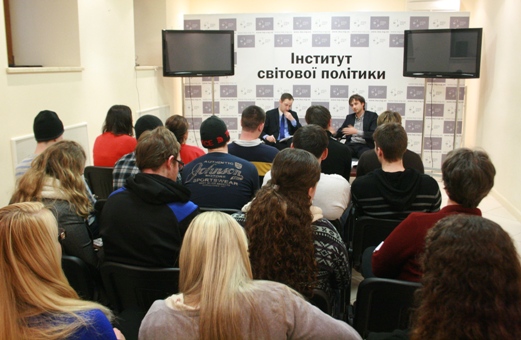The group of students of the Hartwick College (USA) led by Amy Forster Rothbart, Ph.D, Assistant Professor of the Department of Political Science, visited IWP on January 11, 2013 to discuss the IWP’s project “How to get rid of Post-Sovietness”, which was included in the college’s curriculum.The presentation of the the study “How to get rid of post-Sovietness?” was by Sergiy Solodkyy, IWP’s First Deputy Director and Leonid Litra the IWP’s senior analyst. After the presentation the students had an ooprtunity to ask the experts, who were involved in the project implementation, their questions regarding the results of the study.
{1}
The large-scale project “How to get rid of post-Sovietness?” was implemented in partnership with the Georgian Foundation for Strategic and International Studies (Tbilisi, Georgia), the Institute for Development and Social Initiatives “Viitorul” (Chisinau, Moldova) and with support of the Black Sea Trust for Regional Cooperation.
{2}
The project consists of three parts, in which the phenomenon of post-Sovietness in Ukraine, Moldova and Georgia is studied. Choice is motivated not only because those countries were part of the Soviet Union, but also by the fact that they have officially declared the will to join the European Union. In the course of the study, the Institute of World Policy identified attributes of post-Sovietness in politics and society.
The study “How to get rid of Post-Sovietness” has been presented in Moldova
The study “How to get rid of Post-Sovietness” has been presented in Moldova
The presentation of the the study “How to get rid of post-Sovietness?” was held on February 8th in Moldova by Leonid Litra the IWP’s senior analyst, Liubomir Chiriac, IDIS Viitorul (Moldova) Executive Director, and Cornel Ciurea, senior expert of IDIS Viitorul (Moldova). In the presentation the leading political experts and social scientists took part.
The large-scale project “How to get rid of post-Sovietness?” was implemented in partnership with the Georgian Foundation for Strategic and International Studies (Tbilisi, Georgia), the Institute for Development and Social Initiatives “Viitorul” (Chisinau, Moldova) and with support of the Black Sea Trust for Regional Cooperation.
The project consists of three parts, in which the phenomenon of post-Sovietness in Ukraine, Moldova and Georgia is studied. Choice is motivated not only because those countries were part of the Soviet Union, but also by the fact that they have officially declared the will to join the European Union. In the course of the study, the Institute of World Policy identified attributes of post-Sovietness in politics and society
The IWP have also developed 10 recommendations that aim to eliminate post-Sovietness in social-political context. Among them:
1. Europeanization and socialization. The implementation of the set of reforms that would bring all three countries closer to the EU. The introduction of a visa-free regime with the EU, which would allow more Ukrainian, Georgians and Moldovans to see firsthand the benefits of liberal values.
2. Demythologization Soviet legacy. The need for broad public discussion of crimes of the Soviet era, the appropriateness of Soviet symbols in the infrastructure, etc.
3. Active civil society. The higher is the level of public participation and self-organization, the faster democratic traditions will take roots in society and more responsible the government will be.
4. The key role of the media. In the transition period, leading role should be given to the civic journalism and to so-called “muckrakers,” who acutely respond to cases of corruption, nepotism within the government.
5. Implementation of e-governance. Using the latest electronic technology will reduce the level of bureaucracy of the state apparatus and hence would reduce corruption.
6. Exchange programs between regions. The increase of travel of citizens within their countries will reduce social tension assist in overcoming stereotypes, engendered to a certain extent by the Soviet propaganda machine.
7. Contests for public offices. Introduction of more transparent procedures (involving representatives of civil society) for selection of individuals for public office will help in the struggle with nepotism.
8. The fight against corruption. Eradication of corruption using the experience of Georgia.
9. Debureaucratization. Reducing the number of officials and simplification of procedures for receiving certain documents in government
10. Improving educational standards. Recommendations in this area could be summarized in three main points: the decentralization of higher education, strict punishment for any form of plagiarism at university level, and the involvement of employees with Western education and knowledge of foreign languages (especially English) in public administration.




Comments theme
Comments themeComments themeComments themeComments themeComments themeComments themeComments themeComments themeComments themeComments themeComments themeComments themeComments themeComments themeComments themeComments themeComments themeComments themeComments themeComments.